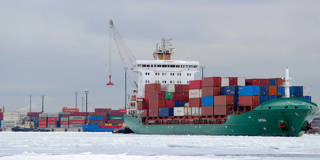Given the horrors of Russia's invasion of Ukraine, the public's support for sanctions has been strong. But, before tightening sanctions further or imposing them indefinitely, Western powers should consider the broader risks to the global economy and the international trade and financial system.
WASHINGTON, DC – To help Ukraine while avoiding a nuclear confrontation between NATO and Russia, the United States and its allies have attacked the Russian economy with trade and financial sanctions on a previously unimaginable scale. But is it the right scale, and are these the right sanctions?
Trade sanctions are prohibitions on exports, imports, or other international transactions – including airline landing rights, asset sales, shipping rights, and port privileges – with a targeted country. Blockades are a well-known wartime sanction, but countries employ sanctions in peacetime as well. The idea is to coerce the targeted country to alter its behavior, by preventing it from enjoying the benefits of exchange with the rest of the world.
The use of sanctions intensified after World War I, when governments, led by US President Woodrow Wilson’s administration, agreed to address international disputes through economic measures instead of military action. This preference for sanctions over violent conflict resumed after World War II and has become more entrenched ever since. By 2020, the US had imposed sanctions on more than 10,000 entities – ten times as many as in 2000 – many of them connected to North Korea, Cuba, and Iran. These measures have largely come in the form of prohibitions (or limitations) on trade with the target country.

WASHINGTON, DC – To help Ukraine while avoiding a nuclear confrontation between NATO and Russia, the United States and its allies have attacked the Russian economy with trade and financial sanctions on a previously unimaginable scale. But is it the right scale, and are these the right sanctions?
Trade sanctions are prohibitions on exports, imports, or other international transactions – including airline landing rights, asset sales, shipping rights, and port privileges – with a targeted country. Blockades are a well-known wartime sanction, but countries employ sanctions in peacetime as well. The idea is to coerce the targeted country to alter its behavior, by preventing it from enjoying the benefits of exchange with the rest of the world.
The use of sanctions intensified after World War I, when governments, led by US President Woodrow Wilson’s administration, agreed to address international disputes through economic measures instead of military action. This preference for sanctions over violent conflict resumed after World War II and has become more entrenched ever since. By 2020, the US had imposed sanctions on more than 10,000 entities – ten times as many as in 2000 – many of them connected to North Korea, Cuba, and Iran. These measures have largely come in the form of prohibitions (or limitations) on trade with the target country.